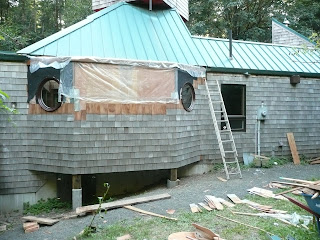A poet and nonfiction writer, Angie Chuang’s work has been published in many literary magazines, including Calyx, Mizna, and The Grove Review. She is an award-winning journalist, and was, for seven years, The Oregonian’s first race and ethnicity issues reporter.
Angie was at Soapstone for a week in the spring of 2006 and again for another week during the winter of 2007; she worked on a memoir that came out of a reporting assignment after September 11 to "put a human face on the country we're about to bomb." It led her on a journey into an Afghan American family's life and story, and took her to Afghanistan and into a long-term friendship with the family. The memoir explores “the complexity between generations, bet ween American and Afghan cultural influences, and between optimism and despair. Ultimately, the family helped me see that Afghanistan as a country--and my own fractious immigrant family--are caught between ways of thinking, between unity and fragmentation.”
ween American and Afghan cultural influences, and between optimism and despair. Ultimately, the family helped me see that Afghanistan as a country--and my own fractious immigrant family--are caught between ways of thinking, between unity and fragmentation.”
She wrote to us after her first week at Soapstone: “Days and nights took on an organic flow around writing--everything either was a preparation for (morning yoga and walks, making coffee and breakfast, tidying up around the house or hauling in wood), or a break from (reading a chapter in a book, making dinner, sleeping) writing. I found myself constantly thinking about what I was writing, but in the best possible way. I'd have breakthroughs and revelations while practicing yoga or on a walk, and I'd actually remember them later on! Luciana Lopez and I are both night owls, and did our most productive writing at night, sometimes very late. It worked out well for us, sitting in front of the Duchess together, writing in mostly silence, into the wee hours sometimes.”
She wrote to us after her second week: “Not only was I able to get more done than I ever would in a one-week period, my writing and thinking were deepened by the simplicity of life at Soapstone, the lack of real-world drains on energy and time. I had breakthroughs that were prompted by the unique environment. One afternoon, during a torrential downpour, watching and listening to the rain glide down the skylight, I was finally able to hone a pivotal chapter that hinged on the description of tropical rains in Taiwan. Another day, I felt unfocused so I told myself I was "locking" myself in the Cube until I could come up with the beginning of another chapter. I sat in there for a long time and inadvertently began the hardest chapter of my memoir, the one I had been dreading writing and therefore had avoided. By the end of the week I had finished it.”
She emailed just recently: “I've been thinking a lot about Soapstone recently because I just did a three-week residency this summer at the Virginia Center for the Creative Arts that dramatically moved my project forward and changed how I see myself as a writer.” Angie is now an assistant professor at the American University School of Communication in Washington, D.C.
RUTH GUNDLE
 I wrote a lot, felt free to experiment, and grew as a writer. Many of my best pieces originated at Soapstone and would never have been written if not for the time away from my hectic life as a reporter for The Oregonian.
I wrote a lot, felt free to experiment, and grew as a writer. Many of my best pieces originated at Soapstone and would never have been written if not for the time away from my hectic life as a reporter for The Oregonian.




